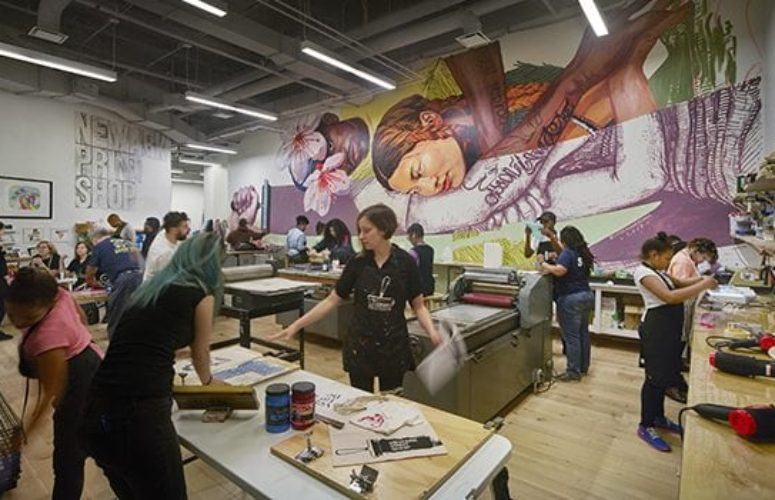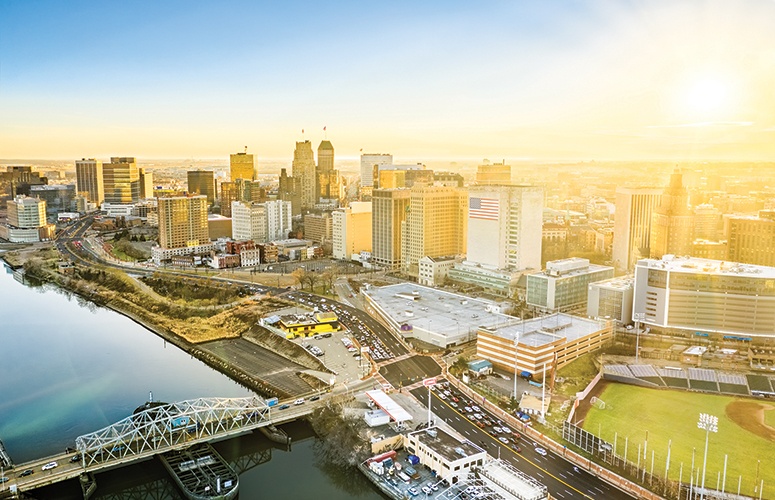
Newark: Large Firms and Local Citizenry
Efforts among the city’s key stakeholders aim to benefit all citizens.
By George N. Saliba, Managing Editor On Jul 17, 2017A Newark stalwart, the law firm of McCarter & English moved to the city in 1865 after it had been founded in Newton two decades earlier. Approximately a century later, the firm had to decide whether or not to remain in the city following 1967’s civil unrest which left 26 people dead and more than 700 injured. This year marks the 50th anniversary of Newark’s civil unrest, and Joseph T. Boccassini, McCarter & English’s firm-wide managing partner, who is resident in the Newark office, tells New Jersey Business, “You have to remember that in 1967, we were not in a virtual world – location really mattered. So beyond the symbolic commitment to Newark, the decision to stay here was emblematic of our belief – ultimately justified – that Newark would recover from the upheaval and come back even stronger. After much reflection and analysis, we bet that Newark was the place for us to be. Frankly, it would have been much easier to go west, as many law firms did, but we believed then – and believe now – that Newark is the commercial and cultural hub of northern New Jersey.”
Recent economic developments in the city – New Jersey’s largest city by population (282,000) – can be rattled off as a roll call of progress and deep investments, ranging from Prudential Financial’s new office tower and, separately, the mixed-used One Theater Square near the New Jersey Performing Arts Center, as merely two examples. As these and numerous other well-publicized economic developments transpire, a recurring theme among Newark stakeholders is their long-standing and ongoing desire to bolster all residents, and – as one interviewee candidly stated – “avoid the ill effects of gentrification.” On these pages, we examine what major corporations and other entities in the city are now doing to benefit all city residents, keeping in mind the sentiment made famous by the late John F. Kennedy: “A rising tide lifts all boats.”
While McCarter & English, for example, has played a prominent role in economic developments in Newark’s current rebirth, it also has been an active community participant. Boccassini provides a litany of ways the law firm interacts with the city, concluding with the fact that, for example, “Under our dynamic pro bono director Michelle Movahed, we hold clinics in our office, including one regarding the naturalization process, and we [also] help low-income veterans get a fresh start. We represent – at no charge – survivors of human trafficking and deserving people who are seeking expungements. We have long represented people seeking restraining orders, including in Newark. And, generally, we adapt our pro bono program to respond to emerging unmet needs.”
PSEG
If McCarter & English assists Newark via the above and other ways, so too does Public Service Enterprise Group (PSEG), also known for its utility subsidiary, Public Service Electric & Gas. Ellen Lambert, chief diversity officer, president of the PSEG Foundation, and senior director of corporate citizenship and culture, comments, “We say we are Public Service Enterprise Group, or Public Service Electric & Gas. Yet, the most important words, really for the foundation and everyone else are: public service. That is what we do, and we try to do that with our funding and volunteering.”
It is perhaps impossible to detail each and every effort undertaken by PSEG to benefit Newark residents on these pages, but, for example, the company has an out-of-school science program for which it funded nearly $600,000 last year, with much of it focused in Newark. Additionally, PSEG is focused on community sustainability. As Lambert says, “How do we take ‘hardscapes’ and transform them? We were involved with Military Park’s [redevelopment, for example].”
In the realm of diversity and inclusion, PSEG says it examines “vulnerable populations,” and asks what they need. Lambert elaborates, “Do we have enough programs where we can employ Newark residents, whether they are high school graduates or whether they have attended college or junior college? We are in the process of developing a much larger program, now, for graduating high school students. We are really looking at: How do we help these young students, and folks out of work, get jobs in an industry (utilities) that is very hard to get jobs in?”
Prudential Financial
Prudential Financial was founded in Newark in 1875, and it not only remained in the city following 1967, but soon thereafter established an array of strategies for assisting residents. Shané Harris, vice president of corporate giving at Prudential Financial, Inc., says, “When I started with the company 13 years ago as a program officer, what struck me about my portfolio was that many of our partners had already had support from Prudential for more than 40 years. We are constantly reminded about how Prudential was a key driver in getting [community] organizations established. Our strategy was really focused on responsive community needs, particularly for children. Years ago, our program areas were called ‘ready to learn, ready to work, ready to live.’ They reflected heavy investments in education, making sure that we were connecting residents to workforce development opportunities, and a reflection that culture and arts – and [other] things that made the community vibrant – were essential.”
Harris details Prudential’s efforts for city residents. Among other comments, she explains, “The North Star for us is making sure that the city continues to grow its economy, leveraging its unique capabilities as a city, but to do that in a holistic way so that residents benefit from those investments. An area of concern is that we do not just revitalize the city so that new residents can come in. We certainly don’t want to deal with the ill effects of gentrification [that exist] in other communities.”
Integrity House
In 1968, Integrity House was founded in Newark primarily as a residential addiction treatment program and has expanded over the past 49 years to include a range of services “to treat the whole person based upon their presenting needs,” explains Robert J. Budsock, president and CEO of Integrity House, who has worked there since 1984. He echoes many of Harris’ sentiments, saying, “I don’t want to speak for the long-time residents of Newark, but I think people want to be careful that they don’t get overwhelmed by the gentrification that is occurring here.
“At the same time, we need to make sure that as Newark becomes revitalized: We don’t take our eyes off of the folks who have been here for the past 50 years; there are employment opportunities; the city becomes safer; and the rising waters benefit every citizen of the City of Newark. And they will.”
Upon providing a detailed description of the comprehensive services Integrity House offers, he adds, “It is really important to get people back to work. Yes, they need to receive their addiction treatment and they need to have a safe place to live, but – at the same time – they need work. … I see the Newark renaissance having a positive impact on the work that we do at Integrity House because of the employment opportunities that are being created for city residents.”
Prudential Center
Prudential Center is an example of one of those employers, and its vice president of community investment and grassroots, Jeff Scott, provides an explanation of the myriad other ways this world-class arena is benefiting both New Jersey and Newark. For example, Scott says, “A program that helps us achieve our community goals is ‘82 Hours,’ an internal community service program that offers employees 82 hours of company time dedicated to giving back to New Jersey’s communities each year. Prudential Center employees have volunteered more than 8,000 hours to communities in New Jersey since the program’s 2014 inception, including planting dune grass on the Superstorm Sandy-ravaged beaches of Lavallette, serving meals at area food kitchens, building playgrounds for students, and stuffing and delivering more than 500 backpacks to students at two Newark Public schools for the start of the school year.”
Another example Scott provides is that “co-owner Josh Harris has made huge strides for youth in the Newark community.” The Harris Family Charitable Foundation in 2016 donated $750,000 to the non-profit After-School All-Stars, a program that offers free after school programming to children in 19 cities across the country. As a result of the generation grant, “the After-School All-Star program was able to expand into the 13th Ave School-Newark and broaden their presence in the communities we call home.”
Panasonic
In 2013, Panasonic Corporation of North America moved its headquarters from Secaucus to a new office tower in Newark. As part of an array of contributions Panasonic has made to the city, Public Relations Manager Mary E. Battle says, “[Panasonic] joined with Newark Mayor Ras J. Baraka and the Rev. Al Sharpton’s National Action Network to support NAN – Newark Tech World, a 10-gigabit Internet and computer-based IT training facility. The newly announced tech center, a revitalized former Boys and Girls Club in Newark’s South Ward, seeks to bridge the tech divide by offering after-school academic enrichment opportunities for Newark students and community members. It offers local Newark students classes in Digital Literacy, web design and networking. Students can go to the center after school to take part in classes and utilize Panasonic technology to complete their schoolwork. The center provides an opportunity for students of this underserved community to develop skills in advanced technologies which are in high demand by the high-tech industry. The learning that takes place at the center will translate into the availability of high-tech talent for businesses in Newark and beyond.”
Rutgers-Newark
Higher education institutions in Newark, including Rutgers-Newark and, separately, the New Jesery Institute of Technology, have been an instrumental component of Newark’s ongoing revitalization. In fact, earlier this year, New Jersey Business witnessed first-hand the grand opening of the repurposed Hahne’s Department Store building, which had been vacant since the 1980s.
Peter T. Englot, senior vice chancellor for public affairs and chief of staff, office of the chancellor, at Rutgers-Newark (RU-N), says, “[Express Newark, the arts incubator that was opened in the newly renovated Hahne & Co. Building this year] is the centerpiece of our activities aimed at cultivating local artistic expression through community engagement and public scholarship. Express Newark is both a partner to community arts organizations throughout the city’s socially, economically and culturally diverse neighborhoods, and a hub of creativity and classes for RU-N programs in photo, design and video. It is a 50,000-square-foot facility where local artists across all of those areas and others can work collaboratively through residencies, giving them access to equipment not readily available elsewhere as well as a supportive, creative community.”
More broadly, Englot says, “The Rutgers-Newark strategic plan has at its core our commitment to fully and purposefully fulfill our role as anchor institution in Newark. Toward this end, we leverage our strengths in five broad areas that capture much of the scholarly expertise and civic-oriented interests of our faculty, staff and students: building strong educational pathways (pre-K-16) for increased postsecondary attainment; strong, healthy and safe neighborhoods; promoting and leveraging the arts and culture; science and the urban environment; and entrepreneurship and economic development.”
NJIT
At the New Jersey Institute of Technology (NJIT), Dr. Joel Bloom provides a detailed overview of NJIT’s interaction with Newark. In part, Bloom says, “Newark is more than the city in which NJIT resides; it is our home and has shaped our evolution into a leader in STEM education and one of only 32 polytechnic universities nationwide. NJIT was founded in 1881 by industrialists for the purpose of educating a skilled workforce for Newark’s businesses, and we never have lost sight of that purpose. Through initiatives such as our Enterprise Development Center and New Jersey Innovation Institute, NJIT has continuously enhanced collaboration and partnership with both government and private industry in the City of Newark. Today, NJIT has an economic impact of $1.74 billion annually on the State of New Jersey and contributes $635 million to the Newark economy, supporting in excess of 4,500 jobs.”
He adds, “Many of our students come from the City of Newark, and many of them were raised in households that have very modest incomes. NJIT has provided those students with critical opportunities for professional success that positively affect the students themselves and their families. Recently, The New York Times reported on a study of ‘America’s Great Working-Class Colleges,’ which ranked NJIT No. 1 in the nation for the upward economic mobility realized by its graduates. Data from the Equality of Opportunity Project showed that a higher percentage of NJIT students coming from the lowest economic strata rise to the upper strata in the years after graduation than do similar students at any other college or university in the United States.”
Horizon Blue Cross Blue Shield of New Jersey
Between the Horizon Foundation and Horizon Blue Cross Blue Shield New Jersey, investments in Newark have approached approximately $21 million since 2004, according to Jonathan Pearson, executive director of the Horizon Foundation for New Jersey, the charitable giving arm of Horizon Blue Cross Blue Shield of New Jersey. A wide range of endeavors are underway with, for example, an especially notable oral health program for children, of which the Boys & Girls Club of Newark was one recipient. Pearson says, “Oral health plays a critical role in your overall health. Dental disease is really common in children, particularly those who are disadvantaged or underserved, or may not have access to [dental care]. We are providing kids with access to dental visits and floride treatments, fillings and extractions. The program is going really well.”
Conclusion
While many of Newark’s anchor institutions aim to improve the lives of all city residents during these times of economic improvements, each community member – whether an institution, business, family or resident – may have a unique perspective on the events that are continuously unfolding in the city. It is nonetheless demonstrable that key city stakeholders often weathered the 1967 civil unrest, and continue to contribute to the municipality as it rises toward even greater heights.
Related Articles:






